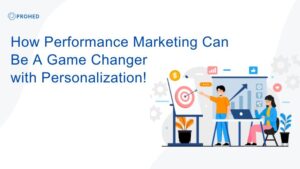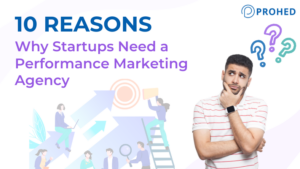In the present times, e-commerce businesses need to be agile and increase their efforts towards winning and keeping customers, so they have to change their policies frequently. There are various means that they can implement. Still, among these measures, performance marketing has emerged as an effective tool that can bring reasonable results and optimize the expenses of advertising. The blog will discuss the role of Performance marketing in driving e-commerce sales and offer some tips for optimizing its influence.
What is Performance Marketing?
Performance marketing is a results-driven approach to achieve specific goals like clicks, conversions or sales. As against traditional marketing approaches which might focus on brand recall, or reach, performance marketing is focused on measurable outcomes. This method is best used by online business owners whose every penny spent on ads matters.
How an E-commerce Businesses Use Performance Marketing?
- Track and measure outcomes: Every part of a campaign, from impressions to conversions, can be measured to determine what works and what doesn’t.
- Optimize spend: When paying per click or sales, businesses can distribute their budget more effectively, ensuring that they only pay for successful results.
- Target with precision: Performance marketing ensures campaigns are highly targeted so that the right audiences are reached at the right time.
Essential Elements of a Successful E-Commerce Marketing Plan

E-commerce businesses can significantly increase sales and customer loyalty by including a marketing strategy in a more comprehensive marketing plan. Here’s how to do it:
Search Engine Marketing (SEM)
Bidding on keywords is part of Search Engine Marketing (SEM), which aims to place you at the top of search engine results pages (SERPs). It works exceptionally well because it attracts highly driven buyers who are already looking for goods just like yours. By using performance-based bidding techniques, online retailers can maximize their return on investment (ROI).
Search Engine Marketing (SEM) & Pay-Per-Click (PPC) Advertising
- Google Ads: Advertise through Google Ads so you can reach people searching for products or services related to what you offer.
- Shopping Ads: Display products visually within Google search results to immediately capture interest.
Social Media Advertising
Facebook, Instagram, LinkedIn, and Reels offer excellent possibilities for focusing on particular interests, habits, and demographics. Thanks to social media marketing, E-commerce companies can start paying for conversions rather than impressions. This makes sure their budget goes towards users who are likely to convert.
Affiliate Marketing
Affiliate marketing is a type of marketing in which businesses partner with marketers who promote their goods in exchange for a percentage of commission. This approach works very well for attracting new clients and generating quick sales without requiring the large upfront costs of conventional marketing.
Retargeting
Retargeting is displaying advertisements to people who have already visited your website but have not completed a purchase. These retargeting advertisements can be optimized for optimum conversions—that is, enabling consumers to return and finish their purchase—by utilizing performance-based marketing strategies.
Email Marketing
When paired with performance marketing techniques, email marketing remains effective for e-commerce companies. By creating groups on your email list based on user behavior and sending customized messages to each group, you could boost engagement and conversion rates.
Influencer Marketing
The societal environment today is all about influencers’ effects. These are professionals in the field or well-known individuals who serve as go-between businesses and clients eager to participate in brand marketing campaigns through a variety of means, such as advertisements and endorsements.
Content Marketing
Release blog posts, articles, and videos that offer solutions to the problems faced by your target audience. Optimize your content for relevant keywords to better rank in organic search results and drive users to your site.
Benefits of Partnering with an E-commerce Marketing Agency
However, many e-commerce businesses have found that by partnering with an e-commerce marketing agency, they can manage better than their in-house teams do:
- Expertise and Experience: E-commerce advertising agencies specialize in running successful performance campaigns. They know how each platform works differently so they can create unique strategies that fit your business needs.
- Access to Advanced Tools: In general, businesses can use advanced marketing tools and analytics platforms that provide more information and make it possible to target a specific audience and optimize them further.
- Scalability: As your business expands, your marketing requirements will change. An agency can scale up its services with your growth, ensuring that your marketing efforts keep working and stay in line with your goals.
Want to know how PROHED is helping in it's Client's Success?
Essential Performance Marketing Strategies for E-commerce
Conversion Rate Optimization (CRO)
Make it simpler for users to complete purchases on the website to improve user experience. This could be giving obvious calls to action, streamlining the checkout process, or optimizing product page design.
Reporting & Data Analysis
Utilize resources like Google Analytics and social media insights services to routinely assess the success of your campaigns. To improve outcomes, identify what works effectively and what doesn’t, then make the necessary adjustments.
A/B Research
Test many iterations of your marketing materials, such as email subject lines, landing sites, and ad copy, to find the ones that are doing the best.
Building Customer Loyalty
To reward loyal consumers and encourage them to return for additional purchases, implement customer loyalty programs.
Challenges and Considerations
Despite the many advantages, some of the challenges include;
- Ad Fraud: Performance marketing is prone to ad fraud where bots or fake users generate clicks or impressions that don’t result in actual sales. It is possible to minimize this risk by dealing with reliable platforms or agencies.
- Complexity: Managing campaigns for performance marketing can be challenging, particularly when there are several platforms and data sources involved. Having the right resources and knowledge in place is essential for success.
- Customer Privacy: With growing concerns over data privacy, e-commerce businesses need to ensure their performance marketing adheres to regulations like GDPR and CCPA.
Conclusion
Whether you are starting or considering scaling up your existing e-commerce operations, performance marketing offers the adaptability and accuracy required to succeed in today’s online market. It works well for driving e-commerce sales because it uses an outcomes-driven, data-driven approach to connect with potential customers and close deals.
If performance marketing is fully incorporated into your enterprise’s marketing plan and combined with the expertise of an e-commerce advertising agency, you can enhance your campaigns, increase your return on investments (ROI), and eventually expand your business.



![Read more about the article Top 5 Trending Brands in Shark Tank India Season 4 [2025]](https://www.prohed.com/blog/wp-content/uploads/2025/01/Blog-Banners-3-300x169.png)
